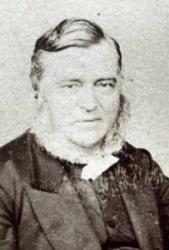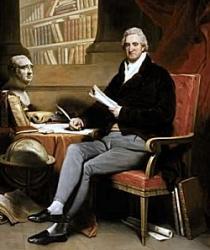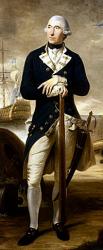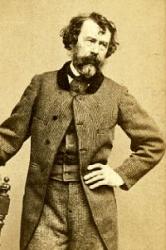Planning worship?
Check out our sister site, ZeteoSearch.org,
for 20+ additional resources related to your search.
- |
User Links
Person Results
‹ Return to hymnal





Export as CSV
Baptist Wriothesley Noel
1799 - 1873 Person Name: Baptist W. Noel Hymnal Number: d239 Author of "Faith is the Spirit's sweet control" in The Church Hymn Book Noel, Hon. Baptist Wriothesley, M.A., younger son of Sir Gerard Noel Noel, Bart., and brother of the Earl of Gainsborough, was born at Leithmont, near Leith, July 10, 1799, and educated at Trinity College, Cambridge. Taking Holy Orders he was for some time Incumbent of St. John's Episcopal Chapel, Bedford Row, London, and Chaplain to the Queen; but in 1848 he seceded from the Church of England, and subsequently became a Baptist Minister. He was pastor of St. John's Street Chapel, Bedford Row, until 1868. He died Jan. 19, 1873. His prose works, about twelve in all, were published between 1847 and 1863. His association with hymnology is through:—
(1) A Selection of Psalms and Hymns adapted chiefly for Congregational and Social Worship by Baptist Wriothesley Noel, M.A. (2) Hymns about Jesus, by Baptist Wriothesley Noel, N.D. A collection of 159 hymns, the greater part of which are his own or recasts by him of older hymns.
The Selection appeared in 1832. It passed through several editions (2nd ed., 1838; 3rd, 1848, &c), that for 1853 being enlarged, and having also an Appendix of 39 original "Hymns to be Used at the Baptism of Believers." From this Selection the following hymns are still in common use:—
1. Devoted unto Thee. Holy Baptism. From "0 God, Who art our Friend."
2. Glory to God, Whose Spirit draws. Holy Baptism.
3. Jesus, the Lord of glory died. Jesus the Guide.
4. Lord, Thou hast promised to baptize. Holy Baptism.
5. We gave [give] ourselves to Thee. Holy Baptism.
--John Julian, Dictionary of Hymnology (1907)
Baptist Wriothesley Noel
John Eustace Giles

1805 - 1875 Person Name: John E. Giles Hymnal Number: d1003 Author of "Thou hast said, exalted Jesus [Savior]" in The Church Hymn Book Giles, John Eustace, was born at Dartmouth in 1805, and educated for the ministry at the Baptist College, Bristol. After preaching for a short time at Haverfordwest, he became, in 1830, pastor of the church in Salter's Hall, London. Leaving Baiter's Hall in 1836, he ministered successively at Leeds, Bristol, Sheffield, Bathmines (Dublin), and Clapham Common, London. He died at Clapham Common, June 24, 1875. His prose works include A Funeral Sermon on the Death of Robert Hall; Lectures on Socialism, &c. From childhood he composed hymns and poetical pieces. In 1834, at the request of the Baptist Missionary Committee, he composed a hymn in celebration of Negro emancipation,
and Nos. 9,16, & 24 in their Jubilee Collection, 1842.
The hymn by which he is best known is:—
Hast Thou said, exalted Jesus? Holy Baptism (Adult). It is a composition of special merit, and in English Baptist congregations is probably oftener sung on Baptismal occasions than any other hymn. It was written "during a serious illness, in 1830, and in anticipation of having to baptize several persons at Salter's Hall, London, on his recovery." (Singers and Songs, 1869, p. 482.) It was printed in 1830 in 6 stanzas of 6 lines. In 1858 it was given in the Baptist Psalms & Hymns, No. 705, with the omission of st. ii. The full original text is in the Baptist Hymnal, 1879, No. 639. It is also in several other collections. [Rev. W. R. Stevenson, M.A.]
-- John Julian, Dictionary of Hymnology (1907)
John Eustace Giles
William Roscoe

1753 - 1831 Hymnal Number: d1025 Author of "Thus said [saith] Jesus, Go and do" in The Church Hymn Book Roscoe, William, the father, was born March 8, 1753, in Liverpool, of humble origin. After very meagre schooling, and three years of work in his father's market garden, he was articled to an attorney, and subsequently practised in Liverpool till 1796, when he withdrew from the profession. From the first literature was his chief delight, and throughout a long career of public usefulness he united its pursuit with the efforts of enlightened patriotism and the advocacy of higher education and reform. Liverpool was a centre of the old slave-trade, and Roscoe was one of the first to raise his voice against the iniquity. At the age of 20 he had already uttered a protest in his descriptive poem Mount Pleasant, and in 1787 he published a longer poem, The Wrongs of Africa (Pt. ii. 1788), devoted to the subject. During his brief parliamentary experience as member for Liverpool, in 1807, he had further opportunity of advocating the cause of liberty and humanity. His first great historical work, the Life of Lorenzo dé Medici, was published in 1796, and the Life and Pontificate of Leo the Tenth, in 1805. After withdrawing from his legal practice, Roscoe had hoped to be able to devote himself entirely to letters, but the claims of friendship induced him in 1800 to enter into a banking business, which involved him in commercial troubles, ending in 1820 in his bankruptcy. His library had to be sold, but part of it was bought by friends, and presented to the Liverpool Athenæum, which in 1789 Roscoe had been instrumental in founding. In 1822 he published Illustrations of the Life of Lorenzo dé Medici, defending the views adopted in his former history, and two years later edited a new edition of Pope's works, with a life of the poet. He died June 30, 1831. (Cf. The Life of William Roscoe, by his son, Henry Roscoe, in 2 vols., London, T. Cadell, 1833.)
As a member of the congregation of Unitarians meeting in Renshaw Street Chapel, Liverpool, Roscoe took part in preparing A Selection of Psalms and Hymns for Public and Private Worship, printed for their use in 1818. He contributed eight hymns and the concluding anthem. Of these hymns the following are in common use at the present time:—
1. Let our loud song of praise arise. Praise.
2. Go, suffering habitant of earth. Life, a Warfare.
3. Great God, beneath Whose piercing eye. Divine Providence.
4. Thus said Jesus, Go and do. Love to our Neighbour.
5. What is the first and great command ? The Commandments.
These hymns are in several Unitarian collections, including Martineau's Hymns, 1840. No. 3 was written in 1788, as a "secular hymn" of ten stanzas, to be sung at the Benn's Garden Chapel on the Centenary of the Revolution.
--John Julian, Dictionary of Hymnology (1907)
William Roscoe
John Dowling
1807 - 1878 Person Name: J. Dowling Hymnal Number: d132 Author of "Children of Zion, what harp notes are stealing" in The Church Hymn Book Dowling, John. (Pavensey, Sussex, England, May 12, 1807--July 4, 1878, Middletown, New York). Baptist. Father of Rev. George Thomas Dowling. Educated in England; received D.D. from Transylvania University in 1846. Pastorates in Catskill, New York, 1832-1834; Newport, Rhode Island, 1834-1836; New York, New York, 1844-1852, 1856-1868; Philadelphia, 1852-1856; Newark, New Jersey. Author of various works, including Exposition of the Prophecies (1840), Defence of the Protestant Scriptures (1843), History of Romanism (1845). Edited and translated other works. In 1849, published A New Collection of Hymns, Designed Especially for Use in Conference and Prayer Meetings, and Fmaily Worship (New York: Edward H. Fletcher). The seven hymns in this collection by Dowling are as follows:
Come, Lord, dwell in my bosom
The weary dove in search or rest
O, my soul is cast down
A weak and weary dove, with drooping wing
Welcome, thrice happy hour
Go to the mercy seat
Children of Zion! what harp-notes are stealing
The last of these was included in other collections as well.
--Deborah Carlton Loftis, DNAH Archives
John Dowling
Sidney P. Gill
Hymnal Number: d441 Author of "I want to be an angel, and with the angels stand" in The Church Hymn Book
Sidney P. Gill
William Hamilton Drummond

1778 - 1865 Person Name: William H. Drummond Hymnal Number: d469 Author of "Is this a fast [day] for me" in The Church Hymn Book Drummond, William Hamilton, D.D., son of an Irish physician, was born at Ballyclare, Antrim, Ireland, 1772, and died at Dublin, Oct. 16, 1865. Educated for the ministry at the University of Glasgow, he became, in 1793, the pastor of the Second Presbyterian Church, Belfast, and in 1816, of the Strand Street Chapel, Dublin. His poetical works include:—
(1) Juvenile Poems, 1797; (2) Trafalger, 1805; (3) The Giant's Causeway, 1811; (4) Clontarf, 1817; (5) Who are the Happy? a Poem, on the Christian Beatitudes, with other Poems on Sacred Subjects, 1818.
In 1818 A Selection of Psalms & Hymns for the Use of the Presbytery of Antrim, and the Congregation of Strand Street, Dublin, was published at Belfast. This Selection was probably edited by Dr. Drummond. It contained several of his hymns. Five of these (Nos. 84, 190, 201, 236, 264) were contributed to that edition.
From Who are the Happy? the following hymns have come into common use:—
1. A voice from the desert comes awful and shrill. Advent. This is in extensive use in the Unitarian hymn-books of America.
2. Come, let us sound her praise abroad. Charity.
3. Father, I may not ask for less. Charity. This is stanzas ii.-v. of No. 2, with a new introductory stanza. In this form the hymn was given in the Leeds Hymn Book, 1853.
4. Give thanks to God the Lord. Victory through Christ. Limited in use, although a hymn of much spirit. It appeared in the Belfast Psalms & Hymns, 1818.
5. O had I the wings of a dove. Retirement. This hymn is not suited to congregational use. It appeared in the Belfast Psalms & Hymns, 1818.
The original texts of these hymns are in Lyra Britannica, 1867, from whence also most of the biographical facts have been taken. A few of Drummond's hymns, in addition to those named, are found in some American Unitarian collections.
-- John Julian, Dictionary of Hymnology (1907)
======================
Drummond, William, p. 312, ii. In the British Museum there is a copy of Drummond's Poems as fol¬lows :— Poems by William Drummond of Hawthornedene. The second Impression, Edinburgh. Printed by Andro Hart, 1616. Neither the Flowers of Zion, nor the translations from the Latin are therein.
--John Julian, Dictionary of Hymnology, Appendix, Part II (1907)
William Hamilton Drummond
Richard Kempenfelt

1718 - 1782 Hymnal Number: d128 Author of "Burst, ye emerald [pearly] gates, and bring" in The Church Hymn Book Kempenfelt, Richard, of Swedish descent, was born Oct., 1718. In Jan., 1741, he obtained a lieutenant's commission in the British Navy. He became captain in 1757, and admiral in 1780. He was drowned in the "Royal George," which sank in harbour at Portsmouth on Aug. 29, 1782. Admiral Kempenfelt was an admirer of Whitefield and the Wesleys, and interested himself much in evangelistic work. His hymns were published as Original Hymns and Poems. By Philotheorus. Exeter, printed by B. Thorn, 1777, and were dedicated "To the Rev. Mr. Fletcher, Vicar of Madeley, in Shropshire." They were reprinted, with a Preface, by D. Sedgwick, in 1861. Although most of these hymns are given in the older collections, only a few re¬main in modern hymn-books, and, including centos, are:—
1. Bear me on Thy rapid wing. Praise to Jesus in Heaven.
2. Burst, ye emerald gates, and bring. Praise to Jesus in Heaven.
3. Gentle Spirit, waft me over. Heaven desired.
4. Hail, Thou eternal Logos, hail. Adoration of Jesus.
5. Hark, 'tis the trump of God. The Last Day.
6. O my Redeemer, come. The Last Day.
Of these Nos. 1 and 2 are from the same hymn; and Nos. 5 and 6 also from another. The original texts of Nos. 3, 5, and 6 are in Lyra Britannica 1867, pp. 349-52.
--John Julian, Dictionary of Hymnology (1907)
Richard Kempenfelt
W. Meynell Whittemore
? - 1894 Person Name: W. M. Whittemore Hymnal Number: d1086 Author of "We won't [we'll not] give up the Bible, God's holy book of truth" in The Church Hymn Book Whittemore, William Meynell, Editor of Sunshine, Rector of St. Katherine Cree, London, is the author of "I want to be like Jesus " (Early Piety), in his Infant Altar, 1842; and "We won't give up the Bible" (Holy. Scriptures), 1839. The form of the latter in Snepp's Songs of Grace & Glory, 1872, is a revision by Bp. John Gregg.
--John Julian, Dictionary of Hymnology, Appendix, Part II (1907)
W. Meynell Whittemore
Thomas Greene
1710 - 1779 Person Name: T. Green Hymnal Number: d612 Author of "My days, my [and] weeks, my [and] months, my [and] years" in The Church Hymn Book Greene, Thomas, of Ware, was for some time a member of the Congregational body in that town. In 1778 a minority of the members, of Arian principles, having obtained the lease of the chapel, the majority seceded and built themselves the "Old Independent Chapel." Mr. Greene was one of these seceders (Miller's Singers & Songs, 1869, p. 314). His Hymns and Poems on Various Subjects, chiefly Sacred, were published in 1780 (2nd ed., 1797). From this work the hymn "It is the Lord, enthroned in light" (Resignation), is taken. In Bickersteth's Christian Psalmody, 1833, it begins, "It is the Lord, my covenant God." In modern collections it is found in both forms. Another hymn from the same work is "The more my conduct I survey " (Trusting in Jesus), as in Spurgeon's 0ur Own Hymn Book, 1866.
--John Julian, Dictionary of Hymnology, Appendix, Part II (1907)
Thomas Greene
Nathaniel Parker Willis

1806 - 1867 Person Name: N. P. Willis Hymnal Number: d942 Author of "The perfect world by Adam trod" in The Church Hymn Book Willis, Nathaniel Parker, was born at Portland, Maine, Jan. 20, 1807, and educated at Yale College, graduating in 1826. After writing for a time for the American Monthly Magazine, which he established, and theNew York Mirror, into which the former was merged, he was attached to the American Legation at the French Court. His stay in Europe extended from 1831 to 1837. On his return he became in 1839 one of the editors of The Corsair. His works are numerous, and include Sacred Poems, 1843. He died Jan. 29, 1867. His sister, Mrs. Parton, is the well-known "Fanny Fern." His hymn —"The perfect world by Adam trod" (Dedication of a Place of Worship), was "Written to be sung at the Consecration of Hanover Street [Unitarian] Church, Boston," in 1826, and since then has been widely used, although of no exceeding merit. [Rev F. M. Bird, M.A.]
-- John Julian, Dictionary of Hymnology (1907)
Nathaniel Parker Willis


 My Starred Hymns
My Starred Hymns


